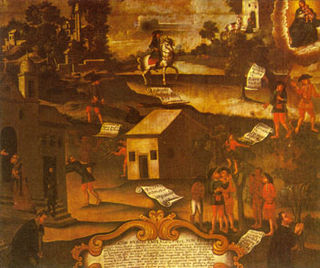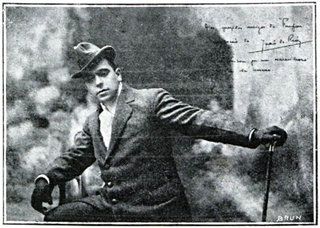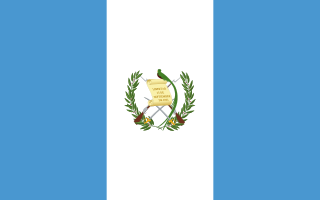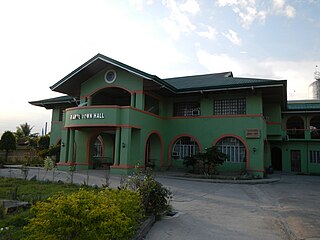
Rio de Janeiro, or simply Rio, is anchor to the Rio de Janeiro metropolitan area and the second-most populous municipality in Brazil and the sixth-most populous in the Americas. Rio de Janeiro is the capital of the state of Rio de Janeiro, Brazil's third-most populous state. Part of the city has been designated as a World Heritage Site, named "Rio de Janeiro: Carioca Landscapes between the Mountain and the Sea", by UNESCO on 1 July 2012 as a Cultural Landscape.
Otto Maria Carpeaux, born Otto Karpfen, was an Austrian-born Brazilian literary critic and multilingual scholar.

The War of the Emboabas was a conflict in colonial Brazil waged in 1706-1707 and 1708-1709 over newly discovered gold fields, which had set off a rush to the region between two generations of Portuguese settlers in the viceroyalty of Brazil - then the Captaincy of São Vicente. The discovery of gold set off a rush to the region, Paulistas asserted rights of discovery and non-Paulistas challenged their claims. Although the Portuguese crown sought more control in the area and the Paulistas sought protection of their claims, the Emoboabas won. The crown re-assessed its position in the region and made administrative changes subsequently.

José Maria da Silva Paranhos Jr., Baron of Rio Branco was a Brazilian diplomat, geographer, historian, monarchist, politician and professor, considered to be the "father of Brazilian diplomacy". He was the son of statesman José Maria da Silva Paranhos Sr. The Baron of Rio Branco was a member of the Brazilian Academy of Letters, occupying its 34th chair from 1898 until his death in 1912. As a representative of Brazil, through his diplomacy, he managed to peacefully resolve Brazil's border disputes with its South American neighbours.
Piedade is Portuguese for pity and may refer to:

Guanabara Bay is an oceanic bay located in Southeast Brazil in the state of Rio de Janeiro. On its western shore lies the cities of Rio de Janeiro and Duque de Caxias, and on its eastern shore the cities of Niterói and São Gonçalo. Four other municipalities surround the bay's shores. Guanabara Bay is the second largest bay in area in Brazil, at 412 square kilometres (159 sq mi), with a perimeter of 143 kilometres (89 mi).
The Campeonato Carioca, officially known as Campeonato Estadual do Rio de Janeiro, was started in 1906 and is the annual football championship of the state of Rio de Janeiro, Brazil. It is under the authority of the state football federation, Federação de Futebol do Estado do Rio de Janeiro.

Rodrigo de Freitas Lagoon is a lagoon in the district of Lagoa in the Zona Sul area of Rio de Janeiro. The lagoon is connected to the Atlantic Ocean, allowing sea water to enter by a canal along the edge of a park locally known as Jardim de Alah.

João do Rio was the pseudonym of the Brazilian journalist, short-story writer and playwright João Paulo Emílio Cristóvão dos Santos Coelho Barreto, a Brazilian author and journalist of African descent. He was elected on May 7, 1910 for the chair # 26 of Brazilian Academy of Letters.

The Brazilian Naval Revolts, or the Revoltas da Armada, were armed mutinies promoted mainly by Admirals Custódio José de Melo and Saldanha Da Gama and their fleet of Brazilian Navy ships against the unconstitutional staying in power of the central government in Rio de Janeiro.
Thiago Ramos Fernandes is a Brazilian former footballer.
The Mister Brazil pageant is the major male beauty pageant held in Brazil. Its organizer, MMB Productions and Events, led by Henrique Fontes and Co. The country is the first in official ranking of Mister World. Besides sending Brazilian representatives to Mister World, the national competition elects for Manhunt International and Mister International.
Paraense Transportes Aéreos was a Brazilian airline founded in 1952. It ceased operations in 1970.

The British Virgin Islands has competed at every edition of the Pan American Games since the ninth edition of the multi-sport event in 1983. The British Virgin Islands did not compete at the first and only Pan American Winter Games in 1990.

The Cayman Islands has competed at every edition of the Pan American Games since the ninth edition of the multi-sport event in 1987. The Cayman Islands did not compete at the first and only Pan American Winter Games in 1990.

Manguinhos Airport was an airport that existed in the neighborhood of Manguinhos, near Oswaldo Cruz Foundation in Rio de Janeiro from 1936 to 1972.

Events in the year 1947 in Brazil.

The Sugarloaf Cable Car is a cableway in Rio de Janeiro, Brazil. Moving between Praia Vermelha and the Sugarloaf Mountain, it stops at Morro da Urca on its way up and down, and reaches the summit of the 1,299-foot (396 m) mountain.

Guatemala competed at the 2016 Summer Olympics in Rio de Janeiro, Brazil, from 5 to 21 August 2016. This was the nation's fourteenth appearance at the Summer Olympics since its debut in 1952, despite failing to register any athletes in three other editions.
This page is based on this
Wikipedia article Text is available under the
CC BY-SA 4.0 license; additional terms may apply.
Images, videos and audio are available under their respective licenses.













